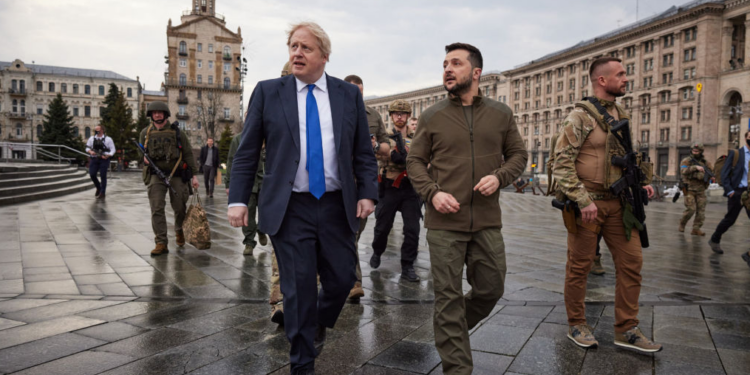Should Volodymyr Zelensky continue to fight endlessly in pursuit of a comprehensive defeat of Russia which may be unattainable – or should he consider cutting his losses and reaching a compromise? That’s the question Owen Matthews asks in the Spectator. Here’s how he begins.
In Ukraine, the political mood has become sombre and fractious. As the front lines settle into stalemate, Russia ramps up for a new season of missile and drone attacks, and vital U.S. support for Ukraine’s war effort crumbles under partisan attack in Congress, one existential question looms large. Should Volodymyr Zelensky continue to fight endlessly in pursuit of a comprehensive defeat of Russia which may be unattainable – or should he consider cutting his losses and reaching a compromise?
At the war’s outset, the Ukrainian President had a clear answer. “I am sure there are people who won’t be satisfied with any kind of peace [with Russia] under any conditions at any time,” he told the Associated Press. “But however hard it is, we have to understand that every war should end in peace or it will end with millions of victims. Yes, we have to fight – but fight for life. Nobody wants to negotiate with a person who tortured this nation. [But] millions of people want to stop this war. We cannot decide for them and say: ‘No, we are not ready to speak with murderers.'”
Zelensky said those words as he sat in a sandbagged stairwell of his presidential palace in Kyiv on April 9th last year. Days before, he had visited the devastated suburb of Bucha, where Russian troops had massacred more than 400 civilians before withdrawing from around the capital. At that time, talks were still theoretically ongoing with the Russians, directly as well as via Israeli and Turkish go-betweens. Indeed, earlier this year, Vladimir Putin claimed that Kyiv’s negotiators had initialled a draft peace plan provisionally entitled ‘A Treaty of Permanent Neutrality and Security Guarantees for Ukraine’ which included a promise not to join NATO as well as limitations on Ukraine’s armed forces. (A former Ukrainian Government source who worked closely with Zelensky at the time of the negotiations confirmed that the details of the draft document alluded to were accurate.)
As Zelensky’s negotiator Mikhail Podolyak told reporters in Istanbul in late March last year, the deal on the table was a ceasefire, the withdrawal of all Russian troops to their positions on the eve of the invasion – but remaining in the self-declared republics of the Donbas and Crimea. “As for Crimea and Sevastopol, we have agreed with the Russian Federation to a 15-year pause and to conduct bilateral talks regarding the status of these territories,” he said.
The then Israeli Prime Minister Naftali Bennett, who was talking both to Putin and Zelensky, recalled in an interview that he left the talks in Istanbul “very optimistic because [Zelensky] renounced joining NATO… I was under the impression that both sides very much wanted a ceasefire.” David Arakhamia, chief Ukrainian negotiator at those peace talks in Istanbul, told Ukraine’s 1+1 TV that “Russia’s goal was to put pressure on us so that we would take neutrality. They were ready to end the war if we accepted neutrality, like Finland once did. And we would make a commitment that we will not join NATO. This was the main thing.”
In the event, there was no ceasefire, no Russian withdrawal to pre-invasion positions, and no deal on a special status for Crimea and the Donbas. At least half a million soldiers have been killed or seriously wounded, according to U.S. estimates, and more than seven million people have fled their homes. Yet the front lines have barely moved from their positions in April last year.
What scuppered the deal? The turning point came between Zelensky’s AP interview on April 9th 2022, when he said that “We don’t want to lose opportunities, if we have them, for a diplomatic solution” and April 12th, when Putin declared that talks were at a “dead end”.
What changed, argues Matthews, was not just Boris Johnson arriving in Kiev later on the 9th with a message that the West didn’t trust Putin and wasn’t ready to negotiate, but a “deep shift” in Ukraine public opinion following the Bucha massacre.
Whether you buy the Ukraine public opinion argument or not (I’m sceptical that this was really more decisive than what Western Governments were saying), Matthews concludes that “this war will end with some kind of negotiation, just like every other war humanity has fought. But the terms Ukraine will reach will be delivered from a position of strength, not near capitulation”.
Certainly Ukraine – backed by Western weaponry, intelligence and expertise – has shown its considerable strength and given the Russians a bloody nose, and then some.
However, Matthews’s claim that in 10 years’ time Ukraine “has every chance” of being a member of both the EU and NATO seems fanciful to me, particularly with the Russians so emphatically against Ukrainian membership of NATO. With NATO Secretary-General Jens Stolten warning last week to brace for “bad news” in the conflict, I’m not sure how strong Ukraine’s position, nor how weak Russia’s position, really is. My fear is that Matthews’s article is yet another example of the triumph of optimism over the cold, hard reality of Russian military strength in the region. But I suppose we shall see.
Worth reading in full.














To join in with the discussion please make a donation to The Daily Sceptic.
Profanity and abuse will be removed and may lead to a permanent ban.